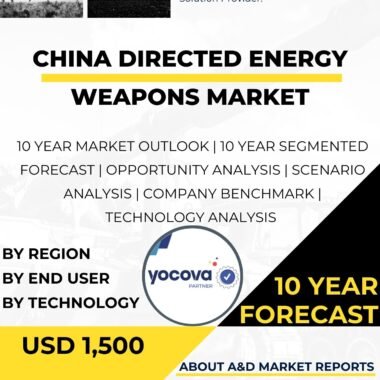Description
The Germany Directed Energy Weapons (DEW) Market is a rapidly emerging and transformative segment within the country’s defense industry. Directed energy weapons utilize focused energy, such as lasers or microwaves, to incapacitate or destroy targets. These cutting-edge weapons offer a range of capabilities, including precision targeting, rapid engagement, and reduced collateral damage, making them highly attractive for modern military applications.
The adoption of directed energy weapons in Germany’s defense sector is driven by several key factors. One of the primary drivers is the need for advanced and innovative technologies to counter evolving threats. Directed energy weapons provide a potential solution to address challenges posed by traditional kinetic weapons, such as range limitations, ammunition supply chain constraints, and escalating costs.
The Germany Directed Energy Weapons Market is fueled by the country’s commitment to technological advancement and maintaining a competitive edge in the global defense arena. Germany recognizes the strategic importance of directed energy weapons in shaping the future of warfare and enhancing its military capabilities.
The Germany Directed Energy Weapons Market also benefits from a robust domestic defense industry with expertise in laser technologies, sensor systems, and precision targeting solutions. German companies are actively engaged in research and development to pioneer directed energy weapon systems, contributing to the country’s self-sufficiency in meeting its defense DEW requirements.
A core objective of the Germany Directed Energy Weapons Market is to provide the German Armed Forces with cutting-edge DEW systems that offer advanced targeting capabilities and operational flexibility. These weapons are designed to counter a wide range of threats, including unmanned aerial vehicles (UAVs), missiles, rockets, and other projectiles.
The adoption of directed energy weapons offers several advantages for the German defense forces. First and foremost, DEW systems offer a rapid and precise response to threats. With their speed-of-light engagement and high accuracy, directed energy weapons can swiftly neutralize targets, reducing the risk to friendly forces and minimizing collateral damage.
Furthermore, the Germany Directed Energy Weapons Market contributes to cost savings in the long term. Unlike traditional kinetic weapons that require expensive ammunition and constant resupply, directed energy weapons have lower operating costs. Once the initial investment is made, the cost per shot for DEW systems is significantly lower, making them more cost-effective over extended missions or engagements.
Moreover, defense DEW systems support enhanced protection for military assets and critical infrastructure. By intercepting and destroying incoming threats at extended ranges, directed energy weapons can provide an additional layer of defense, complementing existing air defense systems and safeguarding strategic assets.
Additionally, the Germany Directed Energy Weapons Market plays a vital role in mitigating collateral damage. Unlike explosive weapons, DEW systems can be precisely tailored to minimize the risk of unintended harm to civilians and infrastructure.
However, the Germany Directed Energy Weapons Market also faces challenges that need to be addressed for successful implementation. One significant hurdle is the need for continuous innovation and development to enhance directed energy weapon capabilities. Advancements in power generation, thermal management, and beam control are critical to improving the efficiency and effectiveness of DEW systems.
Moreover, the Germany Directed Energy Weapons Market must address challenges related to the integration of DEW systems into existing defense infrastructure. Ensuring seamless integration with other defense systems and platforms requires close collaboration between defense contractors and the armed forces.
Looking ahead, the Germany Directed Energy Weapons Market is expected to witness continued growth and technological advancements. As directed energy weapons mature and demonstrate their effectiveness, the demand for these game-changing systems is likely to increase.
The German government’s commitment to investing in directed energy weapon technology and fostering collaboration with defense industry partners will be instrumental in driving the adoption and deployment of state-of-the-art DEW systems.
In conclusion, the Germany Directed Energy Weapons Market is a critical and transformative segment with significant implications for the country’s defense capabilities and military readiness. With a focus on innovation, research, and collaboration, the German defense industry is poised to remain at the forefront of directed energy weapon development. Additionally, by adopting advanced DEW systems, Germany can enhance its defense capabilities, improve operational efficiency, and continue to foster technological innovation in the field of directed energy weapons. As directed energy weapon technology continues to evolve, the Germany Directed Energy Weapons Market will play a pivotal role in shaping the future of warfare and ensuring the success of the German Armed Forces in addressing the challenges of an ever-changing security landscape.




